
Biosensors-Basel
Scope & Guideline
Catalyzing discoveries in biosensors and related fields.
Introduction
Aims and Scopes
- Medical Diagnostics:
Research aimed at developing biosensors for the detection of various medical conditions, focusing on biomarkers, infectious diseases, and metabolic disorders. - Environmental Monitoring:
Studies that involve the use of biosensors for the detection of pollutants, toxins, and pathogens in environmental samples, highlighting the importance of sustainable practices. - Food Safety:
Papers that discuss biosensors designed to detect contaminants, pathogens, and chemical residues in food products, ensuring consumer safety and regulatory compliance. - Nanotechnology Integration:
Research that explores the incorporation of nanomaterials in biosensor design to enhance sensitivity, specificity, and overall performance. - Microfluidic Technologies:
Development and application of microfluidic systems for biosensing, enabling high-throughput analysis and point-of-care diagnostics. - Wearable Sensors:
Innovations in wearable biosensing devices that monitor physiological parameters in real-time, contributing to personalized healthcare.
Trending and Emerging
- CRISPR-Based Biosensors:
An increasing number of studies are focusing on CRISPR technology for biosensing applications, highlighting its potential for precise and rapid detection of nucleic acids. - Artificial Intelligence Integration:
The incorporation of AI and machine learning techniques in biosensor development is trending, enabling improved data analysis and detection capabilities. - Point-of-Care Diagnostics:
There is a growing emphasis on the development of portable and user-friendly biosensors for point-of-care applications, especially in the context of infectious diseases and public health. - Environmental and Food Safety Applications:
Research is increasingly directed towards biosensors that address environmental monitoring and food safety, reflecting societal concerns over health and sustainability. - Wearable Health Monitoring Devices:
The trend towards wearable biosensors for continuous health monitoring is gaining momentum, driven by advancements in materials and miniaturization technologies. - Nanomaterials in Biosensing:
Research focusing on the application of nanomaterials to enhance biosensor performance, including sensitivity and selectivity, is on the rise.
Declining or Waning
- Traditional Chemical Sensors:
There has been a noticeable decrease in papers focusing solely on traditional chemical sensors, as the field increasingly pivots towards more advanced biosensing technologies that incorporate biological elements. - Basic Biosensor Platforms:
Research centered on simple or conventional biosensor platforms is declining, giving way to more sophisticated designs that leverage nanotechnology and microfluidics. - Generalized Diagnostic Approaches:
The trend towards highly specific and tailored biosensing techniques is overshadowing generalized diagnostic methods that do not utilize advanced technologies.
Similar Journals
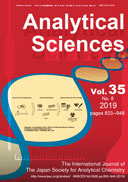
ANALYTICAL SCIENCES
Connecting Scholars, Inspiring InnovationsANALYTICAL SCIENCES, published by SPRINGERNATURE, is a prestigious journal established in 1985 dedicated to advancing the field of analytical chemistry. With an ISSN of 0910-6340 and an E-ISSN of 1348-2246, this journal plays a critical role in disseminating high-quality research and innovative methodologies. Operating from Switzerland, it aims to provide a platform for scholars, researchers, and professionals to explore significant developments and applications in analytical techniques. Although classified in the third quartile (Q3) of analytical chemistry, which places it in a competitive framework (Rank #96/156, 38th Percentile in Scopus), its impact on the discipline is noteworthy. While it is not currently an open-access journal, the resources within are invaluable for those seeking to stay at the forefront of research and practice in analytical sciences, making it an essential read for anyone involved in this dynamic field. The journal continues to converge critical insights from 1985 to 2024, fostering a community dedicated to innovation and excellence in analytical chemistry.

Chemosensors
Connecting Researchers in the Realm of ChemosensorsChemosensors is a distinguished open-access journal published by MDPI, focusing on the innovative field of analytical chemistry and physical and theoretical chemistry. Since its inception in 2013, the journal has rapidly established itself as a pivotal platform for the dissemination of cutting-edge research related to the development and application of chemical sensors, encompassing various methodologies and technologies that contribute to advancements in diagnostics, environmental monitoring, and industrial applications. Based in Switzerland, the journal operates with a commitment to accessibility, ensuring that all published articles are freely available to a global readership. With a current impact factor that positions it in the Q2 quartile for both Analytical Chemistry and Physical and Theoretical Chemistry, Chemosensors attracts a diverse audience of researchers, professionals, and students eager to explore new findings and foster collaborative efforts in sensor technology and its applications. As it continues to grow, Chemosensors remains devoted to advancing scientific knowledge and innovation in its field, making significant contributions to the global scientific community through its rigorous peer-review process.
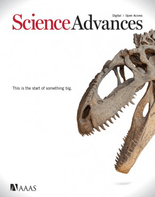
Science Advances
Your Gateway to Cutting-Edge ResearchScience Advances, published by the American Association for the Advancement of Science, is a leading open-access journal in the field of multidisciplinary sciences. Since its inception in 2015, it has rapidly gained prominence, achieving a remarkable Q1 ranking in both Medicine (miscellaneous) and Multidisciplinary categories, underlining its impact and relevance in contemporary research. With an impressive Scopus ranking of #7 out of 171 in the Multidisciplinary field, it proudly sits in the 96th percentile, showcasing its dedication to disseminating high-quality research across various scientific domains. This journal not only provides open access to innovative findings but also aims to foster collaboration and maintain a high standard of scholarly communication among researchers, professionals, and students globally. Stay updated with some of the most groundbreaking advancements and contribute to the collective pursuit of scientific knowledge through Science Advances.

SENSORS is a leading peer-reviewed open-access journal published by MDPI, dedicated to the field of sensor technology and its applications. Established in 2001 and located in Basel, Switzerland, this journal plays a pivotal role in disseminating groundbreaking research encompassing various disciplines, including Analytical Chemistry, Physics, Engineering, and Biochemistry. With a distinguished 2023 Scopus ranking that places it in Q1 across multiple categories and a commendable impact factor reflective of its high-quality contributions, SENSORS has cemented its status as an essential resource for researchers and professionals alike. The journal is committed to facilitating knowledge exchange in cutting-edge sensor technologies, fostering advancement in areas such as instrumentation, medical applications, and electronic engineering. The convenient open-access model ensures that research findings are readily accessible to a global audience, promoting collaboration and innovation within the scientific community. For all those interested in probing the depths of this dynamic field, SENSORS provides a rich repository of research that not only informs but inspires future explorations.

Biomicrofluidics
Empowering scientists with impactful insights in nanoscience.Biomicrofluidics is a leading academic journal published by AIP Publishing, dedicated to disseminating cutting-edge research in the interface of microfluidics and biotechnology. Established in 2007 and continuing through 2024, this journal serves as a vital resource for researchers and professionals across various fields, including Biomedical Engineering, Colloid and Surface Chemistry, Condensed Matter Physics, and Nanoscience. With impactful insights and innovative methodologies, it maintains a commendable reputation, reflected in its impressive Scopus rankings, such as 24th in Fluid Flow and Transfer Processes and 10th in Colloid and Surface Chemistry. Although not an open-access journal, Biomicrofluidics ensures accessibility to its valuable content through various subscription options, facilitating knowledge sharing in scientific communities. This journal is essential for those at the forefront of microfluidic technologies and applications, offering a platform for exploring novel approaches and driving advancement in biomedical and engineering sciences.
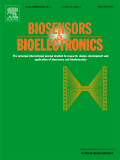
BIOSENSORS & BIOELECTRONICS
Unveiling the Potential of Bioengineering TechnologiesBIOSENSORS & BIOELECTRONICS, published by Elsevier Advanced Technology, is at the forefront of research and innovation in the realms of biomedical engineering, biophysics, and biotechnology. Established in 1990, this esteemed journal has established itself as a premier platform, receiving a prestigious Q1 ranking across multiple categories, including Electrochemistry and Nanoscience, reflecting its critical impact on advancing scientific knowledge and technology. With an impressive range of topics, including the latest trends in biosensor development and bioelectronic application, it serves as an invaluable resource for researchers, professionals, and students alike, facilitating collaborative dialogue and innovative solutions. Though primarily subscription-based, the journal is accessible from its UK headquarters in Oxford, promising rigorous peer-reviewed articles that inform future trends and applications in this dynamic field.

Plasmonics
Exploring the Intersection of Light and MatterPlasmonics, published by Springer, is a prestigious journal dedicated to advancing the field of plasmonics and its interdisciplinary applications, with a particular focus on biochemistry, biophysics, biotechnology, and nanoscience. Established in 2006, this peer-reviewed journal serves as a vital platform for researchers to disseminate groundbreaking findings and innovative methodologies related to the manipulation and application of surface plasmons for various technologies. Featuring an impressive Q3 ranking in critical scientific categories, including Biochemistry and Nanotechnology, Plasmonics is recognized for its contribution to enhancing the understanding of nanoscale phenomena and their relevance to contemporary research and development. While currently not an open-access publication, Plasmonics continues to play a key role in bridging academic inquiry and practical application, making it indispensable for professionals and students striving to stay at the forefront of this dynamic field.
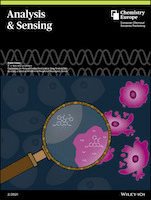
Analysis & Sensing
Transforming Data into Knowledge in Analytical ChemistryAnalysis & Sensing is a prominent academic journal published by WILEY-V C H VERLAG GMBH, focusing on the critical fields of Analytical Chemistry, Electrochemistry, Spectroscopy, and Biochemistry. Established within the converged years from 2021 to 2024, the journal aims to advance knowledge in analytical and sensing techniques, providing a platform for high-quality research that reflects current trends and challenges in the scientific community. With a Scopus ranking that highlights its credibility—ranking 101st in Analytical Chemistry and 43rd in Electrochemistry—the journal caters to researchers, professionals, and students striving to enhance their understanding of analytical processes and methodologies. Although not open access, the quality of the articles published ensures a rigorous peer-review system, making it a vital resource for those who wish to remain at the forefront of research innovation in analytical sciences. Additionally, its global reach, indicated by its effective dissemination and relevance, underscores the journal's significance within the realm of chemical research.
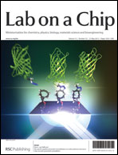
LAB ON A CHIP
Unleashing Potential in Lab-on-a-Chip ApplicationsLAB ON A CHIP, published by the Royal Society of Chemistry, is a prestigious journal that occupies a pivotal position within the realms of biochemistry, bioengineering, and biomedical engineering. With its ISSN 1473-0197 and E-ISSN 1473-0189, this UK-based journal has been at the forefront of microfluidics and lab-on-a-chip technology since its inception in 2001, consistently contributing to advancements in these dynamic fields. The journal enjoys an impressive reputation, boasting a Q1 ranking in several categories, including Biochemistry and Bioengineering, and maintaining a significant presence reflected through its Scopus rankings. The journal's commitment to innovation and cross-disciplinary research is evident as it bridges chemistry with nanoscale science and technology, making it an essential resource for researchers, professionals, and students seeking to stay abreast of groundbreaking developments. Although it follows a traditional subscription model, its high visibility and accessibility underscore the importance of sharing cutting-edge research findings globally. Recognized as a vital platform for fostering scientific discourse, LAB ON A CHIP continues to play a crucial role in shaping the future of laboratory technology and applications.

TALANTA
Advancing the Frontiers of Analytical ChemistryTALANTA, published by Elsevier, is a premier international journal that serves as a vital platform in the field of analytical chemistry. Since its inception in 1958, TALANTA has provided a comprehensive forum for the dissemination of groundbreaking research and developments in chemical analysis, spanning a wide array of topics including biochemistry and spectroscopy. With an impressive impact factor and ranking in the Q1 quartile within its category for 2023, it is ranked #12 out of 156 journals in Analytical Chemistry by Scopus, placing it among the most influential journals in its field. Researchers, professionals, and students benefit from its stringent peer-review process and high-quality content that drives advancements in analytical methodologies and applications. TALANTA's commitment to fostering innovation and excellence in research makes it an indispensable resource for anyone at the forefront of scientific inquiry.